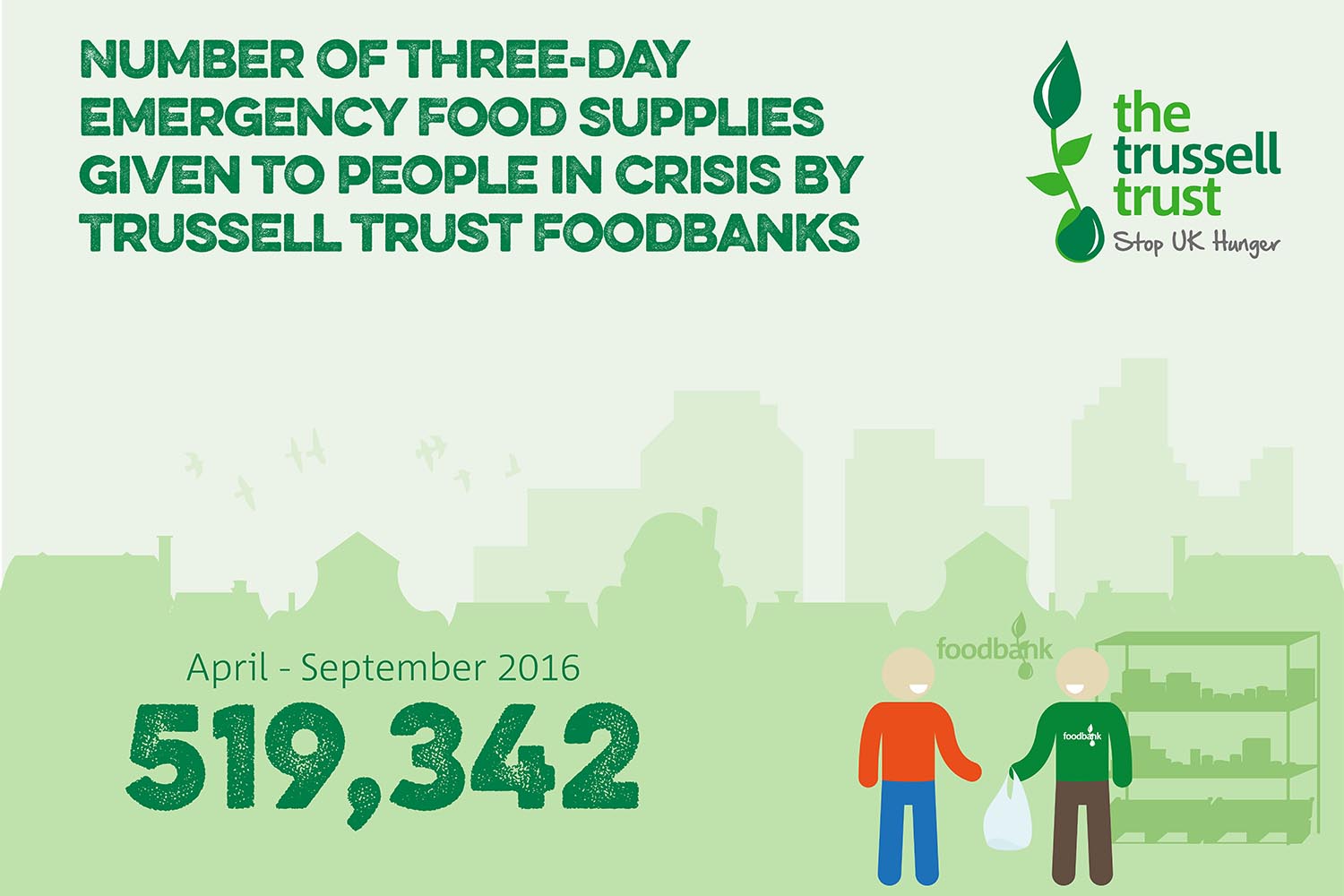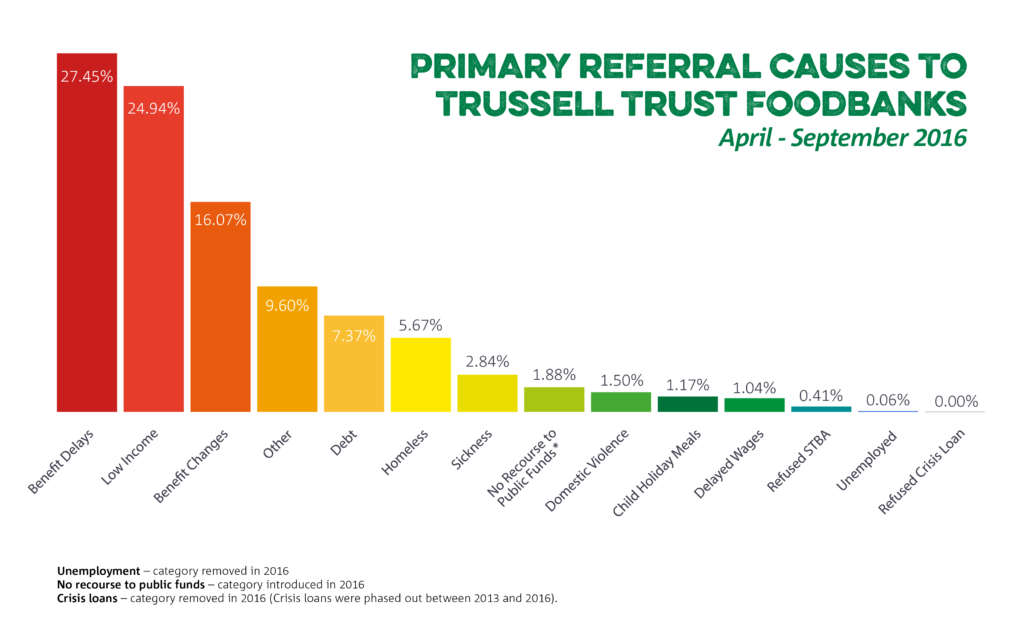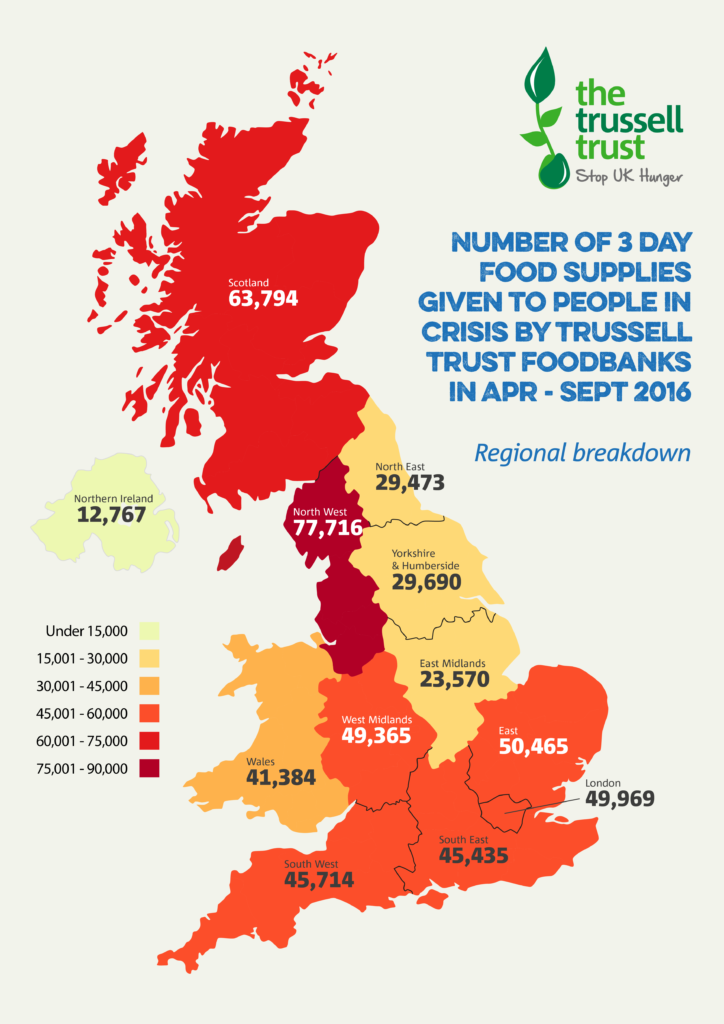- More than 500,000 three day emergency food parcels distributed to people in crisis in first half of the year – over 188,500 to children
- Issues with benefits account for 44 per cent of all referrals
- Charity calls for foodbank telephone ‘hotline’ to local Job Centres to support people in crisis more quickly and efficiently, reducing negative impact on mental wellbeing
Anti-poverty charity, The Trussell Trust, has today proposed a direct telephone line between foodbanks and local job centres – as it reveals that more than half a million emergency food parcels have been issued in the first six months of the year. The staggering number means that the foodbank network is on course to distribute the highest number of food parcels in its 12-year history during 2016-17.
Between April and September 2016, Trussell Trust foodbanks across the UK distributed 519,342 three day emergency food supplies to people in crisis compared to 506,369 during the same period last year. 188,584 of these went to children.
Benefit delays and changes have been the biggest reasons for foodbank use, accounting for forty-four per cent of referrals to Trussell Trust foodbanks (27.4 per cent benefit delay; 16.6 per cent benefit changes). In response the charity is calling for a hotline to each foodbank’s local Job Centre Plus.
Low income was the second largest cause of a crisis, accounting for nearly one in four of all referrals to Trussell Trust foodbanks, driven by problems such as low pay, insecure work or rising costs.
The Trussell Trust recently welcomed moves by the Department for Work & Pensions to look again at disability benefits and Work Capability Assessments and proposes a phone hotline as another measure to help people out of crisis. This would provide timely and invaluable trouble-shooting support for people referred to foodbanks because of problems with a welfare claim.
David McAuley, Chief Executive of The Trussell Trust, comments:
“As the number of emergency food parcels provided to people by foodbanks rises once again, it’s clear that more can be done to get people back on their feet faster. Many foodbanks now host independent welfare and debt advisers but they cannot solve all the issues. To stop UK hunger we must make sure the welfare system works fairly and compassionately, stopping people getting to a point where they have no money to eat. It feels like we could be seeing a new era at the DWP with a consultation on Work Capability Assessments and willingness to engage in dialogue with charities working on the front line. A telephone hotline could build on this and go a long way to improving foodbanks ability to help get people out of a crisis faster.”
A hotline would be a low cost solution that allows foodbank managers and volunteers to support those in serious crises more quickly and efficiently, reducing stress and negative impact on the mental wellbeing of people referred to the foodbank. Evidence from The Trussell Trust network of foodbanks suggests foodbank managers, volunteers and welfare advisers spend a significant amount of time on hold to DWP phone lines on behalf of people in crisis.
Within The Trussell Trust foodbank network, partnership work and ‘More Than Food’ projects that offer additional support to address the underlying causes of a foodbank referral have already had a positive impact. Coventry Foodbank experienced a decrease of nearly 3,000 referrals in 2015-16 compared to 2014-15 and attributes some of this to the introduction of independent welfare advisors. The foodbank works with Citizens Advice on the Restart Project, a Big Lottery-funded partnership which ensures holistic advice is offered in foodbanks.
Volunteers at Coventry Foodbank provide advice to people at the foodbank and, if someone needs to talk to a senior caseworker from Citizens Advice, they can, immediately, using Skype. Of people who receive further assistance 79 per cent do not return to the foodbank for support. More than £700,000 was recouped for people in the form of; debts restructured, people accessing benefits they did not know they were eligible for and overturning sanctions.
When ‘Sarah’ was referred to Coventry Foodbank, she was suffering with debt problems. Before speaking to a Citizens Advice adviser as part of the Restart Project she had been unaware she was entitled to working tax credits. After visiting, she also had her debt repayments renegotiated to sustainable amounts, increasing her income by £155 per week. This meant she could afford food, for herself and her children, and no longer needed the foodbank.
ENDS
Notes to editor
For case study interviews and expert comment, please contact the Trussell Trust media team on 020 3137 3699 / [email protected]. Out of hours call 07789 642 727.
Trussell Trust foodbank statistics:
Trussell Trust statistics are collected using an online data collection system into which foodbanks enter the data from each foodbank voucher. The system records numbers given three-day emergency food supplies. The Trussell Trust is measuring volume – the number of people to whom it has given three days’ food supply (containing enough food for 10 meals).
The Trussell Trust has consistently measured figures in this way and reports them at the middle and end of each financial year. Trussell Trust figures clearly state that we are counting the number of people to whom three days’ food has been given, but these are not necessarily unique people. Our data system is beginning to capture numbers of unique foodbank users on a national scale, and whilst it is too early to accurately use this figure, detailed evidence collected from a range of foodbanks indicates that on average, people needed 2 foodbank referrals in one year, leading us to estimate that approximately 260,000 people are likely to have been unique users in the first six months of this financial year.
- Trussell Trust data collection seeks to comply with ONS guidance. The Trussell Trust receives technical advice from a former senior government statistician, and has consulted with a range of statisticians ahead of publication.
- ‘Benefit delays’ refer to people not receiving benefits to which they are entitled on time, this category can also include problems with processing new claims, or any other time lags in people receiving their welfare payments.
- ‘Benefit changes’ refers to the problems resulting from a change in people’s welfare payments, for example, people having their benefits stopped whilst they are reassessed. This can also include a sanction.
- ‘Low income’ refers to anyone who is struggling to get by on a low income. This could be people in work, or people on benefits, for whom a small crisis e.g. boiler breaking down or having to buy school uniform etc, can be enough to mean that they cannot afford food.
Trussell Trust figures cannot be used to fully explain the scale of the food poverty across the UK, because our figures only relate to Trussell Trust foodbanks and not to the hundreds of other independent food aid providers. There is no official data on other food aid projects, but estimates suggest that there are likely to be the same number again of non-Trussell Trust food bank style projects in the UK.
The Trussell Trust:
- Every day people in the UK go hungry for reasons ranging from redundancy or bereavement to welfare problems or receiving an unexpected bill on a low income. The Trussell Trust’s network of over 420 foodbanks provides three days’ emergency food and support to people in crisis across the UK.
- From April 2015 to April 2016, Trussell Trust foodbanks provided 1,109,309 three day emergency food supplies to people in crisis. Of those helped, 415,866 were for children.
- Everyone who comes to a Trussell Trust foodbank is referred by a frontline professional agency like Citizens Advice, housing associations and children’s centres.
- Trussell Trust foodbanks do much more than food: they provide a listening ear and help resolve the underlying cause of the crisis either through signposting onto relevant local charities or providing on-site immediate support, such as holiday clubs or budgeting and cookery courses.
- Find out more at trusselltrust.org





